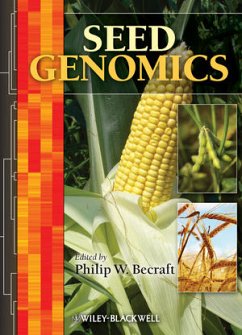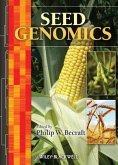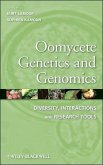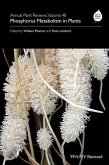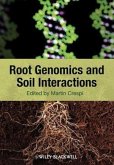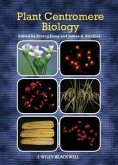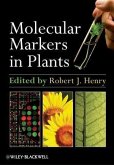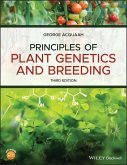Seed Genomics (eBook, PDF)


Alle Infos zum eBook verschenken

Seed Genomics (eBook, PDF)
- Format: PDF
- Merkliste
- Auf die Merkliste
- Bewerten Bewerten
- Teilen
- Produkt teilen
- Produkterinnerung
- Produkterinnerung

Hier können Sie sich einloggen

Bitte loggen Sie sich zunächst in Ihr Kundenkonto ein oder registrieren Sie sich bei bücher.de, um das eBook-Abo tolino select nutzen zu können.
This up-to-date review of seed genomics, from basic seed biology to practical applications in crop science, provides a thorough background understanding of seed biology from a basic science perspective. A valuable resource for advanced graduate students, post-docs, researchers and professionals in the Plant and Crop Sciences, this book brings together top researchers in the field to cover three general themes: genomic approaches to studying seeds, genomic analysis of basic seed biology, and crop seed genomics. A valuable resource for advanced graduate students, post-docs, researchers and professionals in the Plant and Crop Sciences…mehr
- Geräte: PC
- mit Kopierschutz
- eBook Hilfe
- Größe: 28.67MB
![Seed Genomics (eBook, ePUB) Seed Genomics (eBook, ePUB)]() Philip W. BecraftSeed Genomics (eBook, ePUB)187,99 €
Philip W. BecraftSeed Genomics (eBook, ePUB)187,99 €![Oomycete Genetics and Genomics (eBook, PDF) Oomycete Genetics and Genomics (eBook, PDF)]() Kurt LamourOomycete Genetics and Genomics (eBook, PDF)183,99 €
Kurt LamourOomycete Genetics and Genomics (eBook, PDF)183,99 €![Annual Plant Reviews, Volume 48, Phosphorus Metabolism in Plants (eBook, PDF) Annual Plant Reviews, Volume 48, Phosphorus Metabolism in Plants (eBook, PDF)]() Annual Plant Reviews, Volume 48, Phosphorus Metabolism in Plants (eBook, PDF)174,99 €
Annual Plant Reviews, Volume 48, Phosphorus Metabolism in Plants (eBook, PDF)174,99 €![Root Genomics and Soil Interactions (eBook, PDF) Root Genomics and Soil Interactions (eBook, PDF)]() Root Genomics and Soil Interactions (eBook, PDF)193,99 €
Root Genomics and Soil Interactions (eBook, PDF)193,99 €![Plant Centromere Biology (eBook, PDF) Plant Centromere Biology (eBook, PDF)]() Plant Centromere Biology (eBook, PDF)187,99 €
Plant Centromere Biology (eBook, PDF)187,99 €![Molecular Markers in Plants (eBook, PDF) Molecular Markers in Plants (eBook, PDF)]() Molecular Markers in Plants (eBook, PDF)193,99 €
Molecular Markers in Plants (eBook, PDF)193,99 €![Principles of Plant Genetics and Breeding (eBook, PDF) Principles of Plant Genetics and Breeding (eBook, PDF)]() George AcquaahPrinciples of Plant Genetics and Breeding (eBook, PDF)76,99 €
George AcquaahPrinciples of Plant Genetics and Breeding (eBook, PDF)76,99 €-
-
-
Dieser Download kann aus rechtlichen Gründen nur mit Rechnungsadresse in A, B, BG, CY, CZ, D, DK, EW, E, FIN, F, GR, HR, H, IRL, I, LT, L, LR, M, NL, PL, P, R, S, SLO, SK ausgeliefert werden.
- Produktdetails
- Verlag: American Counseling Association
- Seitenzahl: 276
- Erscheinungstermin: 14. Januar 2013
- Englisch
- ISBN-13: 9781118525548
- Artikelnr.: 37757509
- Verlag: American Counseling Association
- Seitenzahl: 276
- Erscheinungstermin: 14. Januar 2013
- Englisch
- ISBN-13: 9781118525548
- Artikelnr.: 37757509
- Herstellerkennzeichnung Die Herstellerinformationen sind derzeit nicht verfügbar.
Introduction 1
Philip W. Becraft
Chapter 1 Large-Scale Mutant Analysis of Seed Development in Arabidopsis 5
David W. Meinke
Introduction 5
Historical Perspective 5
Arabidopsis Embryo Mutant System 7
Large-Scale Forward Genetic Screens for Seed Mutants 7
Approaches to Mutant Analysis 8
Strategies for Approaching Saturation 10
SeedGenes Database of Essential Genes in Arabidopsis 11
Embryo Mutants with Gametophyte Defects 13
General Features of EMB Genes in Arabidopsis 14
Value of Large Datasets of Essential Genes 15
Directions for Future Research 16
Acknowledgments 17
References 17
Chapter 2 Embryogenesis in Arabidopsis: Signaling, Genes, and the Control
of Identity 21
D. L. C. Kumari Fonseka, Xiyan Yang, Anna Mudge, Jennifer F. Topping, and
Keith Lindsey
Introduction 21
Cellular Events 21
Genes and Signaling - the Global Picture 23
Coordination of Genes and Cellular Processes: a Role for Hormones 25
Genes and Pattern 30
Conclusion and Future Directions 36
References 36
Chapter 3 Endosperm Development 43
Odd-Arne Olsen and Philip W. Becraft
Introduction 43
Overview of Endosperm Structure and Development 43
Endosperm Cell Fate Specification and Differentiation 48
Genomic Resources 53
Transcriptional Profiling of Endosperm Development 54
Gene Imprinting in Cereal Endosperm 56
Conclusion 57
Acknowledgments 58
References 58
Chapter 4 Epigenetic Control of Seed Gene Imprinting 63
Christian A. Ibarra, Jennifer M. Frost, Juhyun Shin, Tzung-Fu Hsieh, and
Robert L. Fischer
Introduction 63
Genomic Imprinting and Parental Conflict Theory 63
Epigenetic Regulators of Arabidopsis Imprinting 65
Mechanisms Establishing Arabidopsis Gene Imprinting 69
Imprinting in the Embryo 74
Imprinting in Monocots 75
Evolution of Plant Imprinting 77
Conclusion 78
Acknowledgments 78
References 78
Chapter 5 Apomixis 83
Anna M. G. Koltunow, Peggy Ozias-Akins, and Imran Siddiqi
Introduction 83
Biology of Apomixis in Natural Systems 84
Phylogenetic and Geographical Distribution of Apomixis 89
Inheritance of Apomixis 90
Genetic Diversity in Natural Apomictic Populations 93
Molecular Relationships between Sexual and Apomictic Pathways 94
Features of Chromosomes Carrying Apomixis Loci and Implications for
Regulation of Apomixis 95
Genes Associated with Apomixis 96
Transferring Apomixis to Sexual Plants: Clues from Apomicts 97
Synthetic Approach to Building Apomixis 98
Synthetic Clonal Seed Formation 102
Conclusion and Future Prospects 103
References 103
Chapter 6 High-Throughput Genetic Dissection of Seed Dormancy 111
Jose M. Barrero, Colin Cavanagh, and Frank Gubler
Introduction 111
Profiling of Transcriptomic Changes 113
Use of New Sequencing Platforms and Associated Techniques to Study Seed
Dormancy 114
Visualization Tools 116
Coexpression Studies and Systems Biology Approaches 116
Mapping Populations for Gene Discovery 117
Perspective 118
Acknowledgments 119
References 119
Chapter 7 Genomic Specification of Starch Biosynthesis in Maize Endosperm
123
Tracie A. Hennen-Bierwagen and Alan M. Myers
Introduction 123
Overview of Starch Biosynthetic Pathway 124
Genomic Specification of Endosperm Starch Biosynthesis in Maize 126
Conclusion 134
References 134
Chapter 8 Evolution, Structure, and Function of Prolamin Storage Proteins
139
David Holding and Joachim Messing
Introduction 139
Prolamin Multigene Families 139
Endosperm Texture and Storage of Prolamins 143
Conclusion 154
References 154
Chapter 9 Improving Grain Quality: Wheat 159
Peter R. Shewry
Introduction 159
Grain Structure and Composition 159
End Use Quality 161
Redesigning the Grain 163
Manipulation of Grain Protein Content and Quality 163
Manipulation of Grain Texture 167
Development of Wheat with Resistant Starch 168
Improving Content and Composition of Dietary Fiber 169
Wheat Grain Cell Walls 169
Conclusion 173
Acknowledgments 173
References 173
Chapter 10 Legume Seed Genomics: How to Respond to the Challenges and
Potential of a Key Plant Family? 179
Mélanie Noguero, Karine Gallardo, Jérôme Verdier, Christine Le Signor,
Judith Burstin, and Richard Thompson
Introduction 179
Development of Genomics Tools 180
Applications of Genomics Tools to Legume Seed Biology 185
Future Challenges 192
References 193
Chapter 11 Cotton Fiber Genomics 203
Xueying Guan and Z. Jeffrey Chen
Introduction 203
Cotton Fiber Development 204
Roles for Transcription Factors in Development of Arabidopsis Leaf
Trichomes, Seed Hairs, and Cotton Fibers 204
Fiber Cell Expansion through Cell Wall Biosynthesis 208
Regulation of Phytohormones during Cotton Fiber Development 209
Cotton Fiber Genes in Diploid and Tetraploid Cotton 210
Roles for Small RNAs in Cotton Fiber Development 211
Conclusion 212
References 213
Chapter 12 Genomic Changes in Response to 110 Cycles of Selection for Seed
Protein and Oil Concentration in Maize 217
Christine J. Lucas, Han Zhao, Martha Schneerman, and Stephen P. Moose
Introduction 217
Background on the Illinois Long-Term Selection Experiment 217
Phenotypic Responses to Selection 219
Additional Traits Affected by Selection 220
Unlimited Genetic Variation? 221
Genetic Response to Selection: QTL Mapping in the Crosses of IHP x ILP and
IHO x ILO 222
New Mapping Population: Illinois Protein Strain Recombinant Inbreds 223
Characterization of Zein Genes and Their Expression in Illinois Protein
Strains 225
Contribution of Zein Regulatory Factor Opaque2 to Observed Responses to
Selection in Illinois Protein Strains 227
Major Effect QTL May Explain IRHP Phenotype 228
Zein Promoter-Reporter Lines to Investigate Regulation of 22-kDa ¿-Zein
Gene Expression in Illinois Protein Strains 229
Regulatory Changes in FL2-mRFP Expression When Crossed to Illinois Protein
Strains 230
Regulation of FL2-mRFP 232
Acknowledgments 233
References 234
Chapter 13 Machine Vision for Seed Phenomics 237
Jeffery L. Gustin and A. Mark Settles
Introduction 237
High-Energy Imaging: X-ray Tomography and Fluorescence 238
Optical Imaging: Visible Spectrum 240
Resonance Absorption: Infrared Spectrum 242
Resonance Emission: Nuclear Magnetic Resonance 245
Conclusion 246
Acknowledgments 246
References 246
Color plate section found between pages 42 and 43.
Index 253
Introduction 1
Philip W. Becraft
Chapter 1 Large-Scale Mutant Analysis of Seed Development in Arabidopsis 5
David W. Meinke
Introduction 5
Historical Perspective 5
Arabidopsis Embryo Mutant System 7
Large-Scale Forward Genetic Screens for Seed Mutants 7
Approaches to Mutant Analysis 8
Strategies for Approaching Saturation 10
SeedGenes Database of Essential Genes in Arabidopsis 11
Embryo Mutants with Gametophyte Defects 13
General Features of EMB Genes in Arabidopsis 14
Value of Large Datasets of Essential Genes 15
Directions for Future Research 16
Acknowledgments 17
References 17
Chapter 2 Embryogenesis in Arabidopsis: Signaling, Genes, and the Control
of Identity 21
D. L. C. Kumari Fonseka, Xiyan Yang, Anna Mudge, Jennifer F. Topping, and
Keith Lindsey
Introduction 21
Cellular Events 21
Genes and Signaling - the Global Picture 23
Coordination of Genes and Cellular Processes: a Role for Hormones 25
Genes and Pattern 30
Conclusion and Future Directions 36
References 36
Chapter 3 Endosperm Development 43
Odd-Arne Olsen and Philip W. Becraft
Introduction 43
Overview of Endosperm Structure and Development 43
Endosperm Cell Fate Specification and Differentiation 48
Genomic Resources 53
Transcriptional Profiling of Endosperm Development 54
Gene Imprinting in Cereal Endosperm 56
Conclusion 57
Acknowledgments 58
References 58
Chapter 4 Epigenetic Control of Seed Gene Imprinting 63
Christian A. Ibarra, Jennifer M. Frost, Juhyun Shin, Tzung-Fu Hsieh, and
Robert L. Fischer
Introduction 63
Genomic Imprinting and Parental Conflict Theory 63
Epigenetic Regulators of Arabidopsis Imprinting 65
Mechanisms Establishing Arabidopsis Gene Imprinting 69
Imprinting in the Embryo 74
Imprinting in Monocots 75
Evolution of Plant Imprinting 77
Conclusion 78
Acknowledgments 78
References 78
Chapter 5 Apomixis 83
Anna M. G. Koltunow, Peggy Ozias-Akins, and Imran Siddiqi
Introduction 83
Biology of Apomixis in Natural Systems 84
Phylogenetic and Geographical Distribution of Apomixis 89
Inheritance of Apomixis 90
Genetic Diversity in Natural Apomictic Populations 93
Molecular Relationships between Sexual and Apomictic Pathways 94
Features of Chromosomes Carrying Apomixis Loci and Implications for
Regulation of Apomixis 95
Genes Associated with Apomixis 96
Transferring Apomixis to Sexual Plants: Clues from Apomicts 97
Synthetic Approach to Building Apomixis 98
Synthetic Clonal Seed Formation 102
Conclusion and Future Prospects 103
References 103
Chapter 6 High-Throughput Genetic Dissection of Seed Dormancy 111
Jose M. Barrero, Colin Cavanagh, and Frank Gubler
Introduction 111
Profiling of Transcriptomic Changes 113
Use of New Sequencing Platforms and Associated Techniques to Study Seed
Dormancy 114
Visualization Tools 116
Coexpression Studies and Systems Biology Approaches 116
Mapping Populations for Gene Discovery 117
Perspective 118
Acknowledgments 119
References 119
Chapter 7 Genomic Specification of Starch Biosynthesis in Maize Endosperm
123
Tracie A. Hennen-Bierwagen and Alan M. Myers
Introduction 123
Overview of Starch Biosynthetic Pathway 124
Genomic Specification of Endosperm Starch Biosynthesis in Maize 126
Conclusion 134
References 134
Chapter 8 Evolution, Structure, and Function of Prolamin Storage Proteins
139
David Holding and Joachim Messing
Introduction 139
Prolamin Multigene Families 139
Endosperm Texture and Storage of Prolamins 143
Conclusion 154
References 154
Chapter 9 Improving Grain Quality: Wheat 159
Peter R. Shewry
Introduction 159
Grain Structure and Composition 159
End Use Quality 161
Redesigning the Grain 163
Manipulation of Grain Protein Content and Quality 163
Manipulation of Grain Texture 167
Development of Wheat with Resistant Starch 168
Improving Content and Composition of Dietary Fiber 169
Wheat Grain Cell Walls 169
Conclusion 173
Acknowledgments 173
References 173
Chapter 10 Legume Seed Genomics: How to Respond to the Challenges and
Potential of a Key Plant Family? 179
Mélanie Noguero, Karine Gallardo, Jérôme Verdier, Christine Le Signor,
Judith Burstin, and Richard Thompson
Introduction 179
Development of Genomics Tools 180
Applications of Genomics Tools to Legume Seed Biology 185
Future Challenges 192
References 193
Chapter 11 Cotton Fiber Genomics 203
Xueying Guan and Z. Jeffrey Chen
Introduction 203
Cotton Fiber Development 204
Roles for Transcription Factors in Development of Arabidopsis Leaf
Trichomes, Seed Hairs, and Cotton Fibers 204
Fiber Cell Expansion through Cell Wall Biosynthesis 208
Regulation of Phytohormones during Cotton Fiber Development 209
Cotton Fiber Genes in Diploid and Tetraploid Cotton 210
Roles for Small RNAs in Cotton Fiber Development 211
Conclusion 212
References 213
Chapter 12 Genomic Changes in Response to 110 Cycles of Selection for Seed
Protein and Oil Concentration in Maize 217
Christine J. Lucas, Han Zhao, Martha Schneerman, and Stephen P. Moose
Introduction 217
Background on the Illinois Long-Term Selection Experiment 217
Phenotypic Responses to Selection 219
Additional Traits Affected by Selection 220
Unlimited Genetic Variation? 221
Genetic Response to Selection: QTL Mapping in the Crosses of IHP x ILP and
IHO x ILO 222
New Mapping Population: Illinois Protein Strain Recombinant Inbreds 223
Characterization of Zein Genes and Their Expression in Illinois Protein
Strains 225
Contribution of Zein Regulatory Factor Opaque2 to Observed Responses to
Selection in Illinois Protein Strains 227
Major Effect QTL May Explain IRHP Phenotype 228
Zein Promoter-Reporter Lines to Investigate Regulation of 22-kDa ¿-Zein
Gene Expression in Illinois Protein Strains 229
Regulatory Changes in FL2-mRFP Expression When Crossed to Illinois Protein
Strains 230
Regulation of FL2-mRFP 232
Acknowledgments 233
References 234
Chapter 13 Machine Vision for Seed Phenomics 237
Jeffery L. Gustin and A. Mark Settles
Introduction 237
High-Energy Imaging: X-ray Tomography and Fluorescence 238
Optical Imaging: Visible Spectrum 240
Resonance Absorption: Infrared Spectrum 242
Resonance Emission: Nuclear Magnetic Resonance 245
Conclusion 246
Acknowledgments 246
References 246
Color plate section found between pages 42 and 43.
Index 253
